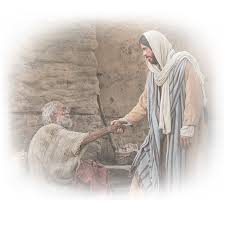By Student Preacher Grant Schleiter ’23 (Elmhurst, IL)
In today’s gospel Jesus lays out the connection between him and God the father. Jesus describes himself as a reflection of God, stating that “for what he does, the Son will also do.” God showed his love for us by creating us and then taking on human flesh as Jesus. Our goal as Christians is to mimic the life of Christ, and walk the way of our Savior.
I am not saying we all have to go sit in a desert for 40 days, or get nailed to a cross. I am saying we must do what Jesus did the most: preach. Share the Good News of God with others.
Let’s do some simple math. What is 2 to the power of 1? 2. What about 2 to the power of 2? 4. 2 to the power of 3 is eight. Now does anyone know what 2 to the power of 2000? Toby? Quinn? Mr. Finnell? Let’s just say it is far larger than the current world population of 7.8 billion. If we say that Jesus entered the world sometime before the “year 0” and began his teaching a few decades after that, by the end of the third decade CE there would be at least one Christian in the world. And if this Christian inspired someone else through sharing the teachings of Jesus, so now we are at 2 followers at the end of that year. If every succeeding year, every Christian made one disciple, what would happen after 2000 years?
Referencing my math earlier, if every Christian were to share the Good News to one person a year, the number of Christians would be well over our world population. But instead the number of Christians is declining. From 1976 to 2022 the United States has declined from 91% Christian, to 64%. To follow in the footsteps of God, we need to share the good news and inspire others.

I can assume most people in this auditorium right now cannot just pull out a Bible verse for every situation in life, but once again this is not necessary for effective preaching. All you need is a common understanding of the scripture, and to learn how Jesus acted. The easiest way to do this is the Gospel. There are 8,760 hours in a year, and God only asks you for 52 of those. If Jesus sacrificed His whole life for you on the cross, you can sacrifice .59% of your year for Him. And if you worry that you have not been going to Mass enough, now is the time to start. Jesus will never leave you. Like a lighthouse, His light will always project in your darkness. The closer you are to the light, the closer you are to the safety of shore.
Brothers and sisters, we have such a great gift in our faith, and the best thing we can do is give it to others. Procrastination of our faith impacts others and may contribute to the decline in Christianity. God did not put us on this world to effortlessly cruise through life expecting to make it into Heaven. God expects us to take the stairs instead of the escalator when it comes to our faith. Putting in that extra work to not only focus on yourself, but also to focus on others. Going to Mass, learning about the Gospel, turning the other cheek, and following the golden rule are all simple ways we can take the extra step in our Faith. Faith can make a tremendous impact on someone’s life, so the best thing we can do for others is let them also enjoy the gifts of God’s love.
As Lent starts to come to a close and the Easter season begins, let us think about the sacrifices Jesus made, and think about what we can do to spread the Love of God shown through the sacrifice of Jesus on the cross. Embrace God’s love and spread that to others; in doing so, you will be a true reflection of Jesus. We are all very fortunate enough to receive education on Theology here at Fenwick, so use that knowledge and spread it to others that are not as fortunate. I know each and every one of you are great people, because you are all God’s children, and to mimic Jesus we must also be fishers of men and bring more people into our faith.

















 Who is God? Much of theology at Fenwick revolves around this question. Who is the God of Abraham, the God of Moses, the God-man Jesus? What does it mean to interact with this God? They are big questions, and the answers have significant impact on our lives of faith. It makes a big difference if we think that:
Who is God? Much of theology at Fenwick revolves around this question. Who is the God of Abraham, the God of Moses, the God-man Jesus? What does it mean to interact with this God? They are big questions, and the answers have significant impact on our lives of faith. It makes a big difference if we think that:
